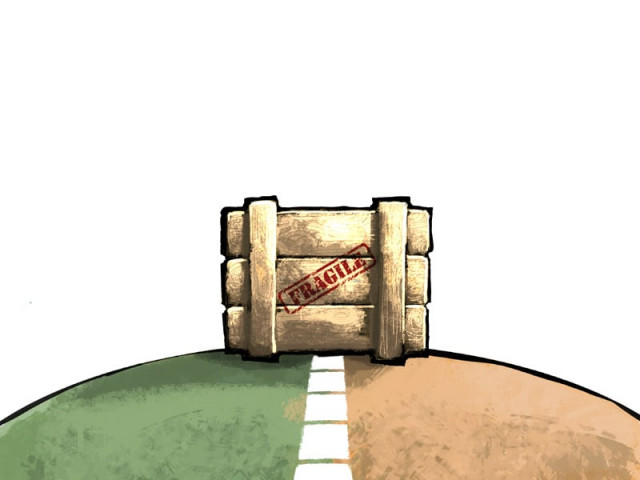Pakistan losing out on South Asian integration: experts
Hostile relations with India hampering efforts to gain foothold in region

Hostile relations with India hampering efforts to gain foothold in region. ILLUSTRATION: JAMAL KHURSHID.
The crux of the session focused on whether policymakers should consider an incremental approach and distinguish among normal trade, and opening of land and transit routes. Another question was that whether Pakistan’s current trade policy results in loss of prosperity, as the country is left out from plans towards South Asian integration.
The seminar was jointly organised by the Institute of Policy Reforms (IPR) and the Lahore Chamber of Commerce and Industries (LCCI) on Tuesday.
Former finance minister and IPR Chairman Humayun Akhter Khan said that normal trade with India has been under discussion for many years. Rigorous assessment of cost and benefits is the only way to take a decision and to move this matter to closure.
He said that this approach would also bring all stakeholders on common ground.
“On one hand, Pakistan does not have normal trade relations with India and on the other hand, Pakistan and India are members of the South Asian Free Trade Area (SAFTA),” he said. “This apparent incongruity reflects the reality of our bilateral relations. Decision on trade with India, therefore, must harmonise among security, economic, and trade interests.”
Speaking at the occasion, former Pakistani ambassador and permanent representative to World Trade Organisation, Dr Manzoor Ahmad listed the specific risks and benefits of trade with India. He said that developing economies, that are globally integrated, experience sustained growth.
“Over 60% of global trade takes place via the supply chains of multinational corporations who make their buying decisions in all parts of the world,” he said.
According to Ahmad, Pakistan’s trade policy results in losses. “The country risks further growth loss if it was left out from recent moves towards South Asian integration,” said Ahmad. “We must find a way to build on South Asia’s dynamism.”
He added that past research on Pakistan and India trade overwhelmingly showed significant economic benefits for our economy. He questioned why Pakistan delayed normal trade relations as GOP’s negative list of tariff lines, since 2012, meant that substantial trade is open to begin with.
Among those items still restricted and likely to face stiff competition from India, such as pharmaceuticals and auto parts, sufficient legal remedies are available to protect them. He said that some agriculture products face unfair competition from India, but those tariff lines are already open for import.
LCCI’s Pakistan India Trade Committee Head Aftab Vohra relied on extensive personal experience of trading on Pakistan’s border with India.
He said that Pakistan businesses would benefit greatly by opening the trade route.
Published in The Express Tribune, July 8th, 2015.
Like Business on Facebook, follow @TribuneBiz on Twitter to stay informed and join in the conversation.



















COMMENTS
Comments are moderated and generally will be posted if they are on-topic and not abusive.
For more information, please see our Comments FAQ